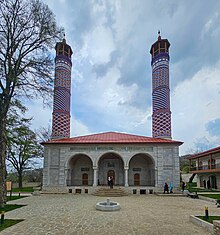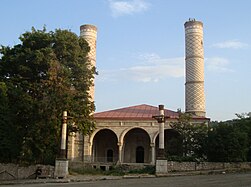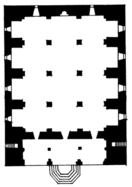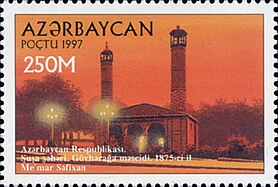Yukhari Govhar Agha Mosque
| Yukhari Govhar Agha Mosque | |
|---|---|
 The main facade of the mosque in 2024 | |
| Religion | |
| Affiliation | Islam |
| Branch/tradition | Shia Islam |
| Location | |
| Location | Shusha, Azerbaijan |
| Geographic coordinates | 39°45′36″N 46°45′09″E / 39.7600°N 46.7526°E |
| Architecture | |
| Architect(s) | Karbalayi Safikhan Karabakhi |
| Type | Mosque |
| Style | Islamic architecture |
| Founder | Ibrahim Khalil Khan |
| Date established | 1768–1885 |
| Minaret(s) | 2 |
Yukhari Govhar Agha Mosque (Azerbaijani: Yuxarı Gövhər Ağa məscidi, is a mosque located in the city of Shusha, Azerbaijan. The mosque also bears the name Boyuk Juma (Great Mosque) of Govhar Agha (Azerbaijani: Gövhər Ağanın Cümə məscidi).[1]
History
[edit]
The Yukhari Govhar Agha means "The Upper Govhar Agha Mosque" in Azerbaijani, referring to the location of the mosque in the upper section of Shusha town and to distinguish it from the Ashaghi Govhar Agha Mosque, the same-name mosque located in the lower section of the town. Both mosques are considered symbols of Shusha and masterpieces of Eastern architecture.[2][3] The Yukhari Govhar Agha Mosque is located on Shusha's main square, Yusif Vazir Chamanzaminli street and makes up a big part of the architectural complex including madrasa, shops, and houses built by the same architect.[1][4] According to historian and author of "Karabakh-name", Mirza Jamal Karabakhi, construction of the mosque was started with orders of Ibrahim Khalil Khan in 1768 (1182 according to the Islamic calendar) but was stopped for a long time. The construction was then restarted and completed in 1883–1885 by architect Karbalayi Safikhan Karabakhi ordered by Govhar Agha, daughter of Ibrahim Khalil Khan.[5]
The exterior and interior
[edit]
The prayer hall of Yukhari Govhar Agha Mosque is a three-nave in a square shape (190–185 meters) split by 6 stone columns. The three-beam veranda in the northern section of the mosque gives it a rectangular form (26.5 × 21.5 meters). The mosque has two minarets. The balconies used to host women's premises of the prayer hall. The interior of the prayer hall gets light from dual windows. The two minarets on the facade make up the veranda. The building of the mosque was constructed out of stone, while the two minarets are made of bricks. The minarets have cylindric forms with horizontal belts, with each section laid in distinguishing brick patterns. The same construction pattern can be viewed in most of the mosques throughout Karabakh built by Kerbalayi Safikhan Karabakhi.[1]
Current situation
[edit]
In Soviet times, the mosque was closed and used as a museum but reopened as a functioning mosque in 1988. After the capture of Shusha by Karabakhi-Armenian forces in 1992, the mosque stopped functioning.[6] Following a minor restoration of the mosque in 2008–2009, fixing the roof,[7] officials from Nagorno-Karabakh Ministry of Economy ordered a restoration project, hiring Iranian experts to carry out the restoration works.[8] Azerbaijani officials expressed their unhappiness with the restoration project, with the Deputy Chairman of the State Committee for Work with Religious Organizations Gunduz Ismayilov claiming that "Armenia's intention to restore the historical Azerbaijani mosque in Shusha is an attempt to cover up the vandalism it did to Azerbaijani cultural-religious monuments in the occupied territories".[9]
After several years of restoration work, the Yukhari Govhar Agha Mosque, neighboring madrasa, and park were formally opened for tourism with a ceremony on 14 October 2019.[10] The project was undertaken by the Initiative for Development of Armenia (IDeA) Foundation with the support of private donations, with notable contributions from Russian-Armenian businessman Ruben Vardanyan's Revival of Oriental Historical Heritage Foundation.[11] and Kazakh businessman Kairat Boranbayev.[12]
The complex was to be used as an Armenian-Iranian Cultural Center. Notably, there was no mention of the former Azeri presence and the complex was presented as an Iranian mosque.[13] There are now plans to convert the building back into a functioning mosque.[citation needed]
The first Friday prayer was held in the mosque, after 28 years, on 13 November 2020 by Azerbaijan soldiers.[14][15]
Gallery
[edit]-
The mosque in 2010
-
View from south-west in 2014
-
The mosque in 2015
-
One of the newly restored minarets
-
Upper Mosque of Shusha. View from the south-west in 2019 after restoration
-
The architectural plan of the mosque
-
Mosque on the stamp of Azerbaijan
See also
[edit]References
[edit]- ^ a b c "Shusha State Historical & Architectural Reserve". Archived from the original on 4 October 2010. Retrieved 20 July 2010.
- ^ "PACE – Urgency to prevent the destruction of cultural monuments in the Armenian-occupied town of Shusha of Azerbaijan". Retrieved 20 July 2010.
- ^ "Чудеса Азербайджана". Archived from the original on 20 November 2021. Retrieved 26 July 2010.
- ^ "Наши культурные ценности – Шушинский район". Archived from the original on 23 October 2010. Retrieved 26 July 2010.
- ^ Elturan Avalov (1977). Архитектура города Шуши и проблемы сохранения его исторического облика. Baku: Elm. p. 54.
- ^ "Human Rights group". Archived from the original on 26 July 2011. Retrieved 23 July 2010.
- ^ LLC, Helix Consulting. "Excavation works start in the Iranian Upper Mosque of Shushi". www.panorama.am. Retrieved 14 September 2022.
- ^ "Karabakh readies restoration project for Persian mosque".
- ^ "Azerbaijan reacts to Iranian company restoring mosque in Shusha". Archived from the original on 3 August 2017. Retrieved 2 August 2017.
- ^ "Gohar Agha Upper Mosque restored, inaugurated as Armenian-Iranian Cultural Center in Artsakh". armenpress.am. Retrieved 12 May 2020.
- ^ "Верхняя мечеть Шуши обрела вторую жизнь" [The Yukhari Govhar Agha Mosque Is Revived] (in Russian). Golos Armenii. 15 October 2019.
- ^ Жуков, Иван (31 January 2018). "Кайрат Боранбаев жертвует средства на восстановление мечети в Нагорном Карабахе". forbes.kz. Retrieved 12 May 2020.
- ^ "Karabakh's contentious mosque restoration | Eurasianet". eurasianet.org. Retrieved 12 May 2020.
- ^ "İyirmi səkkiz ildən sonra Şuşada cümə namazı qılındı". azerbaijan-news.az. 13 November 2020.
- ^ "Karabakh: Shusha hears Friday prayer call after decades".







